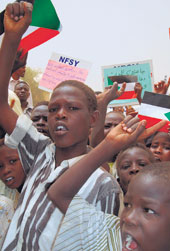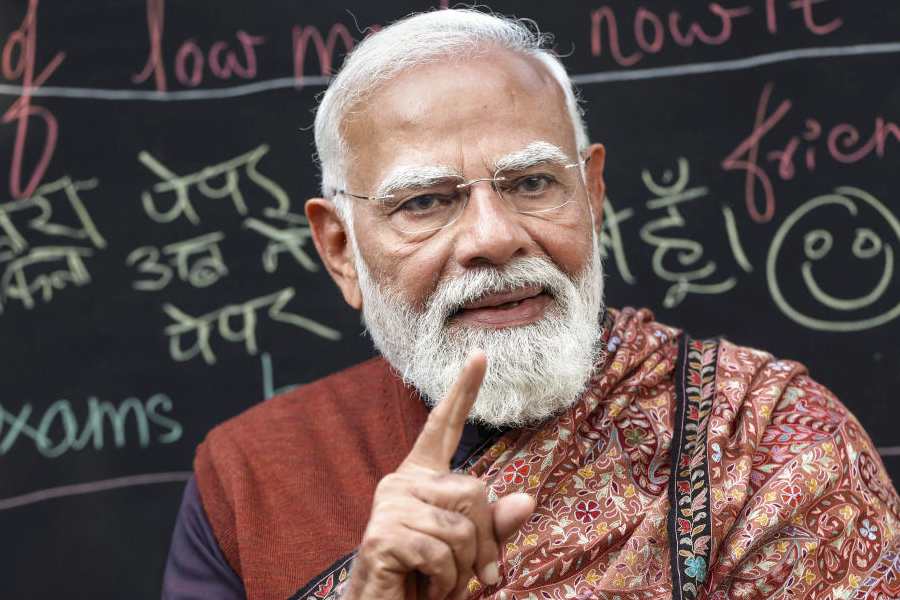 |
| Outrage: Students in Khartoum protest against the Darfur war crimes cases being referred to the International Criminal Court |
Tourism isn’t what figures prominently on Philippe Kirsch’s agenda when he heads for India. A lawyer by profession, the Canadian has had a tough job on his hands ever since he took over as the president of the International Criminal Court (ICC) in March 2003 ? that of getting some of the biggest democracies of the world to ratify the judicial institution. India happens to figure in that list, next to the US and China.
“It’s unfortunate that some of the bigger countries are still not on board,” says Kirsch. “Right now, the ICC is functioning properly, but greater participation from all corners of the world may be required if it were to continue working well.”
The ICC is an independent judicial body, operating out of The Hague in the Netherlands. Unlike the International Court of Justice, which is an organ of the UN, it doesn’t deal with disputes between nations and can only prosecute individuals. By singling out individual perpetrators instead of states, the ICC can help minimise friction between countries.
“The ICC doesn’t have universal jurisdiction and primarily takes up cases from partner countries,” says Kirsch, who was in India earlier this month. “However, it entertains appeals from non-member states or even individuals, provided they abide by the ICC’s jurisdiction on a case-by-case basis.”
The history of the ICC dates back to the Fifties when, in the aftermath of post-World War II trials held at Nuremberg and Tokyo, the UN General Assembly urged the International Law Commission (ILC) to work towards forming an international court which could try acts of genocide. Pushed to the backburner during the Cold War era, the issue came up once again in the Nineties, and a draft for the inception of the ICC was adopted by global representatives at the ILC’s Rome Conference in July 1998.
In April 2002, ratification by 60 countries brought the ICC treaty into force, thereby enabling the court to try acts of genocide, war crimes and crimes against humanity committed after July 1, 2002. Since then, the ICC has been ratified by close to 100 countries. Currently, it has on its hands three cases referred by state parties, and the more notorious Darfur atrocities in Western Sudan, referred by the UN Security Council.
Clearly, the fundamentals on which the ICC is based seem to point in the right direction when it comes to wiping out crimes against humanity. But what worries advocates of the court are the apprehensions that some nations ? including India ? continue to harbour. India, for instance, was involved in formulating the draft of the statute, but abstained from voting on it in 1998.
“One of India’s main reservations is about the inherent jurisdiction of the ICC,” says Usha Ramanathan, a law researcher and advisor to the ICC India campaign. “It means that the court has the authority to decide whether or not to take up a case by determining if a state has acted in a manner consistent with justice or not. India believes this policy is violative of national sovereignty.” However, as Ramanathan points out, “It must be remembered that the ICC upholds human rights, and is thus a court worth going to.”
Some believe that the ICC should only be invoked in so-called “failed states”. But the court can be of use to even a country like India. “There are several offences which are not defined well in the Indian Penal Code,” says Ramanathan. “India, for example, is still not familiar with genocide, for it has never really occurred here. The ICC is better equipped to deal with such cases.”
India, of course, has other reservations too. The non-inclusion of terrorism within the ICC’s jurisdiction is an area of concern. Also, many in the government feel that the ratification of the ICC would mean giving an international body the right to intervene in a country’s domestic issues.
“But most of these are just myths,” says Vahida Nainar, a lawyer, women’s activist and a campaigner for the ICC. “The ICC cannot rule on political issues,” she says, adding that many crimes classified as terrorism are within the definition of offences set out by the ICC. “Besides, crimes against women are accounted for by the ICC, which is unprecedented in the domain of international justice,” she says.
With campaigners going on an awareness overdrive, much of the resistance against the ICC seems to be on the wane, says Ramanathan. But no one can say with conviction just when the court will get that decisive nod from India. But ICC campaigners hope that it will. And when that happens, it might just have been worth the wait.










